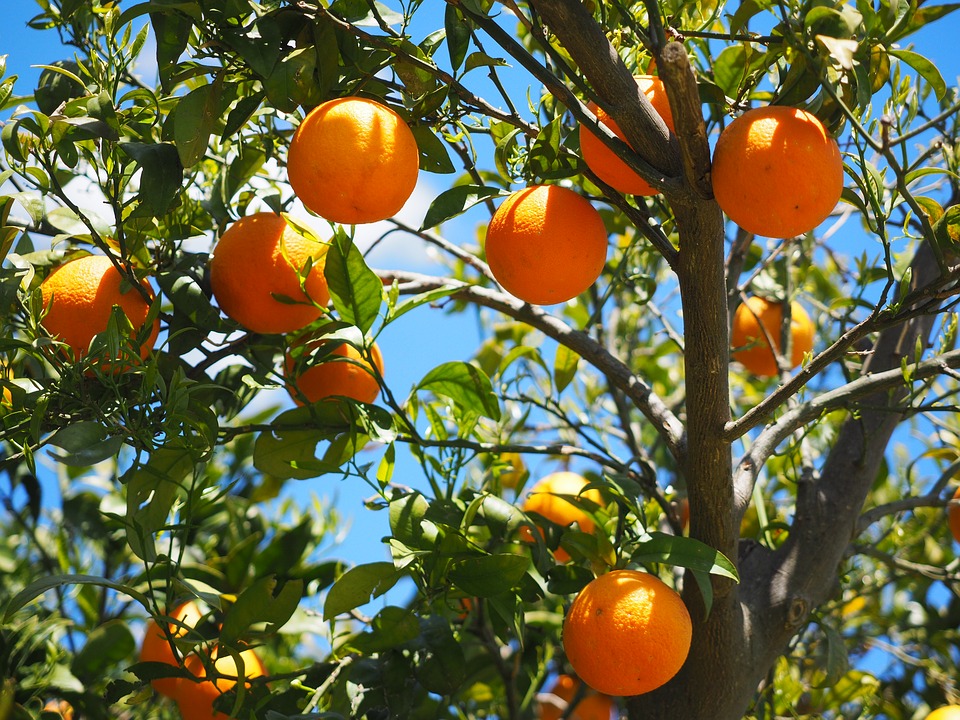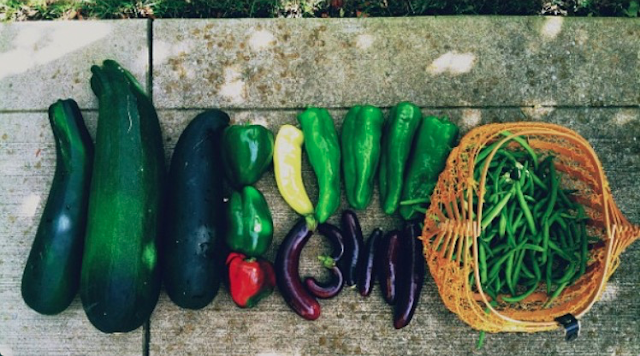The craft of food
My grandfather always wore a muted tan hat. I don't know the name of that style hat because we still call it the "Pappou hat."
The back of it wore layers of stained sweat as Pappou bent over, legs apart, knees slightly bent, and the sun at his back. He inspected each tree in his backyard grove caressing the rough bark with his tanned fingers. I studied the wrinkles etched around his eyes caused by years of sun exposure as he focused on the details of the fruit.
He mumbled something in Greek as he shuffled along to the next tree.
"Pappou, why is this tree growing a lemon and an orange?" I asked.
He didn't make eye contact as he explained 'grafting.' I watched his expressionless face barely paying attention to his words. His hands moved and his weight shifted on both feet as he turned to demonstrate his skills. He danced with the magical fruit trees.
Each day that week I visited those trees. I pretended like I knew what to look for. I studied the leaves, the fruit, and the bark taking mental notes. Then all at once...tiny orange fruit appeared! We harvested it for a mid-day snack, we ate it, and the transparent juice ran down my chin.
Then it was gone. Just like that.
It was in that moment that I appreciated food for more than it's deliciousness, but for its purity and its renewability. I went outside and plucked a ripe orange off the tree for my 10 seconds of satisfaction. And I swear it tasted better after a long day of swimming. I wanted that moment again and again so I returned to the trees each day.
Food is created, but all at once its gone. We engage in this process so often we forget it truly is art and we take it for granted.
We have other moments like this too though:
Happy hour with friends. Buttery movie theater popcorn. Should I go on?
Are the friends, entertainment, and music the components that add meaning or is it the food alone?
We destroy when we cut, harvest, or discard.
We create when we cook a meal,
but we destroy in that we break down food compounds.
We create when we serve.
We destroy when we chew and digest.

The process is cyclical and happens so quickly we fail to consider its impact on our daily lives. Therefore, what is food and how do we measure its quality?
Is it beautiful? Is beauty both creation and destruction?
One enables the other, but both have to occur for survival.
Claude Levi-Strauss' "Culinary Triangle" introduces this thinking in that we have culturally constructed food into raw, cooked, or rotten categories placing positive or negative associations on each. With these categories we 'know' what is beautiful and what is not.
He says, "Cooking is a language through which society unconsciously reveals its structure."
In other words, one component of this culinary triangle, cooking, is both a construction and deconstruction of food communicating what society approves or disapproves of. Our fears and our desires are shaped by time and trends and experiences, not necessarily the physical presentation of food itself. Although aesthetics shape many aspects of our society, it is a faulty measure of quality.
Our culture instructs how our food is perceived and therefore how we perceive our food. Therefore we live in nostalgia of recreating our past food journeys, while creating new ones. We exist eating through life in a blissful memory of what was and what could be and that is what food is.
The back of it wore layers of stained sweat as Pappou bent over, legs apart, knees slightly bent, and the sun at his back. He inspected each tree in his backyard grove caressing the rough bark with his tanned fingers. I studied the wrinkles etched around his eyes caused by years of sun exposure as he focused on the details of the fruit.
He mumbled something in Greek as he shuffled along to the next tree.
"Pappou, why is this tree growing a lemon and an orange?" I asked.
What magical fruit tree was this?
He didn't make eye contact as he explained 'grafting.' I watched his expressionless face barely paying attention to his words. His hands moved and his weight shifted on both feet as he turned to demonstrate his skills. He danced with the magical fruit trees.
Each day that week I visited those trees. I pretended like I knew what to look for. I studied the leaves, the fruit, and the bark taking mental notes. Then all at once...tiny orange fruit appeared! We harvested it for a mid-day snack, we ate it, and the transparent juice ran down my chin.
Then it was gone. Just like that.
It was in that moment that I appreciated food for more than it's deliciousness, but for its purity and its renewability. I went outside and plucked a ripe orange off the tree for my 10 seconds of satisfaction. And I swear it tasted better after a long day of swimming. I wanted that moment again and again so I returned to the trees each day.
Producing and consuming food is a special art form in that it doesn't last forever, it comes and goes. Unlike paintings and sculptures, it is always changing because it is created and recreated. Food is contradiction. We need it, but we want it too.
Pappou knew this and he kept it alive in his stories, his skills, and his delicious product. He knew that his fruit trees and skills would one day disappear.
When he passed I remembered the little he taught me about food and farming and I wished for just 1 more day with him. The orange trees were chopped down and I knew I would never taste an orange like that again. It would never be the same.
A special craft
Do we ever create the same dish twice?
How is agriculture development evolving?
New eyes, new hands, and new trends have cultivated and prepared the foods we love for centuries. It is an art that is a large part of why we feel connected to food and nature. It is arguably the most intimate art form we engage in every single day; 3 or more times a day at that.
Food is created, but all at once its gone. We engage in this process so often we forget it truly is art and we take it for granted.
The meaning of food
Does food have meaning or do we assign meaning to food?
All we have to do is watch Netflix series, Chef's Table, and Massimo Bottura makes us have empathy for a fallen mound of Parmesan Reggiano cheese wheels. We have other moments like this too though:
Happy hour with friends. Buttery movie theater popcorn. Should I go on?
Are the friends, entertainment, and music the components that add meaning or is it the food alone?
Beauty is fleeting
Food is a combination of creation and destruction.
We create when we plant, sow, water, or feed.We destroy when we cut, harvest, or discard.
We create when we cook a meal,
but we destroy in that we break down food compounds.
We create when we serve.
We destroy when we chew and digest.

The process is cyclical and happens so quickly we fail to consider its impact on our daily lives. Therefore, what is food and how do we measure its quality?
Is it a number of nutrients? Is it colorful and diverse? Where does it come from? How is it produced?
Is it beautiful? Is beauty both creation and destruction?
One enables the other, but both have to occur for survival.
Claude Levi-Strauss' "Culinary Triangle" introduces this thinking in that we have culturally constructed food into raw, cooked, or rotten categories placing positive or negative associations on each. With these categories we 'know' what is beautiful and what is not.
He says, "Cooking is a language through which society unconsciously reveals its structure."
In other words, one component of this culinary triangle, cooking, is both a construction and deconstruction of food communicating what society approves or disapproves of. Our fears and our desires are shaped by time and trends and experiences, not necessarily the physical presentation of food itself. Although aesthetics shape many aspects of our society, it is a faulty measure of quality.
Our culture instructs how our food is perceived and therefore how we perceive our food. Therefore we live in nostalgia of recreating our past food journeys, while creating new ones. We exist eating through life in a blissful memory of what was and what could be and that is what food is.



Comments
Post a Comment